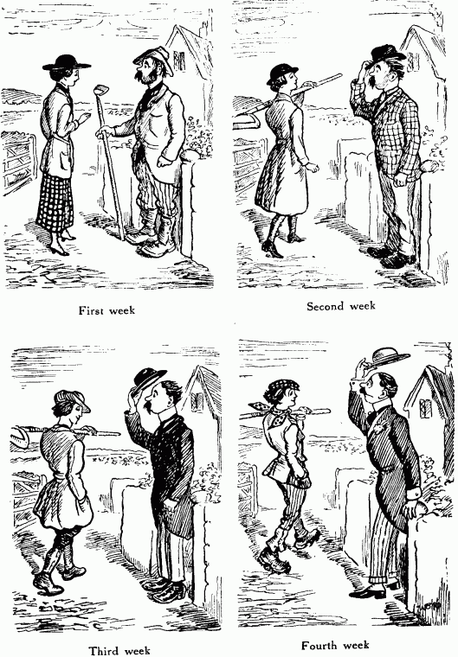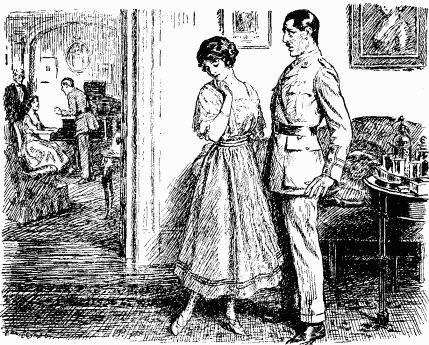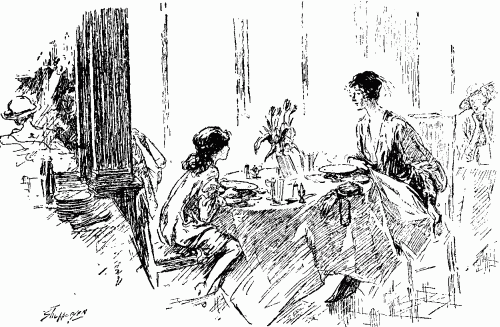Gallery Walk:
The Home Front
The home front changed. Pure and simple. Whether it changed physically due to death and destruction, or whether it was the people on the "(home) front lines" that changed, regardless, change was everywhere and it was drastic.
Let's continue to use some of the sections of Mr. Punch's History of the Great War. Ironically, the information in the chapters and sections directly related to the home front need no propaganda or exaggeration, as it was the people themselves that lived it every day. In fact, these parts of the book might be the most real one might ever find. Read through the sections below, examine the pictures, and answer the questions.
Let's continue to use some of the sections of Mr. Punch's History of the Great War. Ironically, the information in the chapters and sections directly related to the home front need no propaganda or exaggeration, as it was the people themselves that lived it every day. In fact, these parts of the book might be the most real one might ever find. Read through the sections below, examine the pictures, and answer the questions.
Often times, the changes were subtle and out of view.
1. What is the thesis of the above cartoon?
Mr. Punch continues below:
Perhaps the greatest change exhibited is the change in gender roles during the War. As you see in the poem, the need for more "sweetness and light" (money for sugar and money for electricity necessitated a woman's entry into the labor forces. It only would last, "till we break the brutal foe" and after the war, many women were "pushed out" of jobs and back into the homes, but for now, as the cartoon above illustrates, women started wearing the metaphorical "clothes of the man". Said Punch, "It is quite impossible to keep pace with all the new incarnations of women in war-time--'bus-conductress, ticket-collector, lift-girl, club waitress, post-woman, bank clerk, motor-driver, farm-laborer, guide, munition maker."
But the "role of the man" would change a bit as well! Examine this piece of the text:
2. In what ways has the "male gender role", or at least how he's perceived in the "husband and wife couple" changed since the war's onset?
1. What is the thesis of the above cartoon?
Mr. Punch continues below:
- A full list of the private secretaries of the new private secretaries of the members of the new Government may at any moment be disclosed to a long suffering public. On the Home Front the situation shows that a famous literary critic [from a local newspapers] was also a true prophet:
O Matthew Arnold! You were right:
We need more Sweetness and more Light;
For till we break the brutal foe,
Our sugar's short, our lights are low.
The domestic problem daily grows more acute. A maid, who asked for a rise in her wages to which her mistress [denies], explained that the gentleman she walked out with had just got a job in a munition factory and she would be obliged to dress up to him.
Perhaps the greatest change exhibited is the change in gender roles during the War. As you see in the poem, the need for more "sweetness and light" (money for sugar and money for electricity necessitated a woman's entry into the labor forces. It only would last, "till we break the brutal foe" and after the war, many women were "pushed out" of jobs and back into the homes, but for now, as the cartoon above illustrates, women started wearing the metaphorical "clothes of the man". Said Punch, "It is quite impossible to keep pace with all the new incarnations of women in war-time--'bus-conductress, ticket-collector, lift-girl, club waitress, post-woman, bank clerk, motor-driver, farm-laborer, guide, munition maker."
But the "role of the man" would change a bit as well! Examine this piece of the text:
- At home, khaki weddings are becoming common form. By an inversion of the old order, the bride is now eclipsed by the bridegroom:
'Tis well: the lack of fine array
Best fits a sacrificial altar;
Her man to-morrow joins the fray,
And yet she does not falter;
Simple her gown, but still we see
The bride in all her bravery.
2. In what ways has the "male gender role", or at least how he's perceived in the "husband and wife couple" changed since the war's onset?
Mr. Punch says that, "Four years of war have brought curious changes to 'our village':
Our baker's in the Flying Corps,
Our butcher's in the Buffs,
Our one policeman cares no more
For running in the roughs,
But carves a pathway to the stars
As trooper in the Tenth Hussars.
The Mayor's a Dublin Fusilier,
The clerk's a Royal Scot,
The bellman is a brigadier
And something of a pot;
The barber, though at large, is spurned;
The Blue Boar's waiter is interned.
The postman, now in Egypt, wears
A medal on his coat;
The vet. is breeding Belgian hares,
The vicar keeps a goat;
The schoolma'am knits upon her stool;
The village idiot gathers wool.
Our butcher's in the Buffs,
Our one policeman cares no more
For running in the roughs,
But carves a pathway to the stars
As trooper in the Tenth Hussars.
The Mayor's a Dublin Fusilier,
The clerk's a Royal Scot,
The bellman is a brigadier
And something of a pot;
The barber, though at large, is spurned;
The Blue Boar's waiter is interned.
The postman, now in Egypt, wears
A medal on his coat;
The vet. is breeding Belgian hares,
The vicar keeps a goat;
The schoolma'am knits upon her stool;
The village idiot gathers wool.
3 What other "societal changes" has war brought?
Finally, "scrimping and saving" seemed to be the name of the game. Observe the text below:
Furthermore,
- Daylight saving is again being talked of, and it would surely be an enormous boon to rush the measure through now so that the Germans may have less darkness of which to take advantage...[Eventually], the Daylight Saving Bill became Law on May 17. Here is a true economy, and our only regret is that Mr. Willett, the chief promoter of a scheme complacently discussed during his lifetime as ingenious but impracticable, should not have lived to witness its swift and unmurmuring acceptance under stress of war.
Furthermore,
- At home we have to note the steady set of the tide of public opinion in favor of Food Control. The name of the Dictator [as associated with our Prime Minister] is not yet declared, but the announcement cannot be long postponed. Whoever he may be, he is not to be envied....The Food Controller asks us to curtail our consumption of bread by one-fourth. Here, at least, non-combatants have an opportunity of showing themselves to be as good patriots as the Germans and of earning the epitaph': "Much as he loved the staff of life, he loved his country even more."
4. CONCLUSION: Of all the changes brought during wartime, which ones were the most dramatic and broadest reaching?




